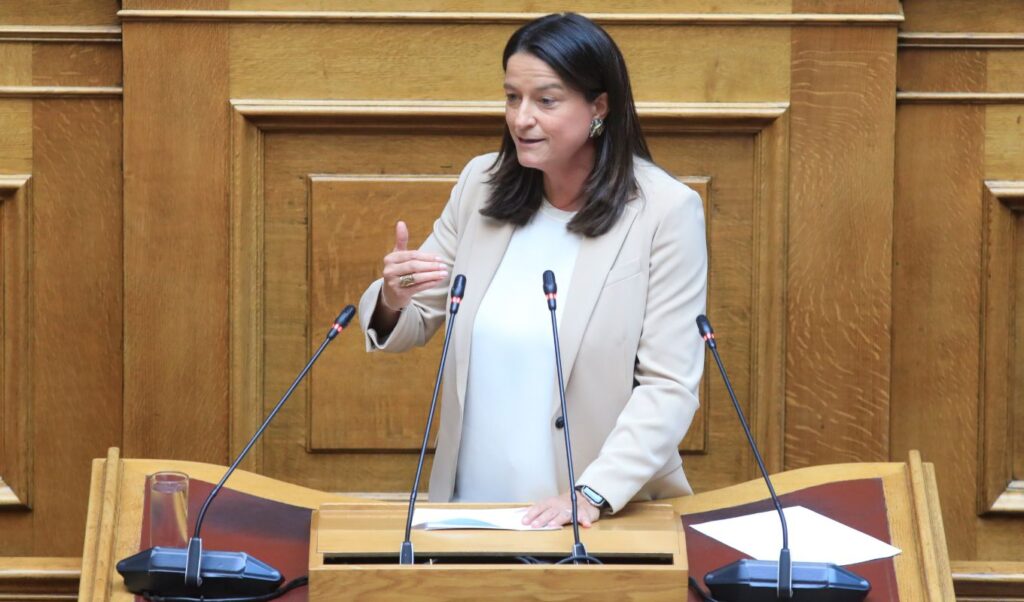The creation of approximately 50,000 new job positions is the target of the new subsidy program being activated by DYPA, as emphasized by Labor and Social Security Minister Niki Kerameos at the 9th Annual Economic Conference of EENE themed “Europe & Greece 2030: A Different Taxation for Development.” The program will last six months, within the framework of the new philosophy adopted by the Ministry of Labor. “When we took over the government 6 years ago, unemployment was at 18%. Today it is ten points lower, at 8%. 500,000 of our fellow citizens who were not working are now employed. We are at the lowest unemployment rate in the last 17 years. This is a change of philosophy – subsidizing work, not unemployment,” Minister Kerameos emphasized.
She argued that non-wage costs have decreased significantly in recent years, emphasizing that efforts will continue to strengthen employment and competitiveness. “We are listening to EENE’s proposal regarding the provision of further incentives to businesses for upskilling and reskilling,” said the Labor Minister, calling on businesses to invest in upgrading their human resources’ skills.
Kerameos: Emphasis given to specializations with high demand
She also referred to the importance of vocational apprenticeship schools, explaining how emphasis is placed on specializations with high demand, such as programmers, machine operators, plumbers, and electricians, with job market absorption reaching 100%. “Collaboration between private and public sectors is essential – osmosis to offer specializations that are missing from the market,” Minister Kerameos added.
Haris Daskalakis, Board Member of EENE and CEO of BCA College, spoke about two major problems. The first is digital illiteracy in businesses, with EENE proposing that companies take on the cost of skills upgrading, which would translate to salary increases, with the increase amount being tax-free. “The second problem, which we haven’t even discussed, is that there aren’t many executives in the market,” Mr. Daskalakis noted, adding that this could be partially solved by strengthening student immigration.
Gianna Chormova, Director of DYPA, focused on DYPA’s decisive role in the new employment landscape, giving special emphasis to training and retraining actions. As she said, training and certification of 450,000 unemployed individuals has already been completed, while there is close cooperation with Greek universities. “We design and promote targeted measures, with short-duration training programs and horizontal education actions in new subjects,” Ms. Chormova mentioned.
During the discussion coordinated by George Kefalogiannias, Co-Founder & Partner of Intellectica, Ms. Chormova explained that there is cooperation with the market itself and the educational community to develop programs that meet the needs of the job market not only today but also in the coming years. The DYPA Director added that EENE’s proposal is being examined with interest, emphasizing that the next cooperation memorandum will be with EENE.
Manolis Christodoulakis, MP of PASOK – Movement for Change, emphasized that during the fiscal crisis period, the critical issue was finding work, but today it is finding specialized personnel. He stressed that Greece lags in digital maturity, ranking third from last in Europe. Europe’s goal is that by 2030, 60% of adults will have access to skills enhancement, with the current European average at 37% and Greece at just 11%.
“In skills upgrading there are three involved parties: businesses, workers, and the state. The more parties that are satisfied, the more correct a proposal is,” Mr. Christodoulakis emphasized, arguing that EENE’s proposal satisfies all three sides. “No one can disagree with EENE’s proposal. PASOK agrees completely,” he added.
Giannis Panagopoulos, President of GSEE, noted that investment in human resources should not be considered a cost, arguing that current policies do not correspond in practice to what needs to be done. “There is no binding planning for the entire country, no institutional framework that supports workers in this direction,” Mr. Panagopoulos explained.
He mentioned that our country has among the lowest wages in Europe, with a fully deregulated collective bargaining framework and increased working hours through technicalities. As he said, only 24-29% of employees are currently covered by collective labor agreements, characterizing it as essential to link training with wage increases. “Greece needs a major social and development agreement, a social contract,” the GSEE President emphasized.
Irini Vlachaki, Head of Athens Office of the Directorate-General for Economic and Financial Affairs of the European Commission, characterized human resources as a basic advantage of the EU, and initiatives focusing on skills development, research increase, and market strengthening have been adopted in this direction. “Especially in skills, there is still considerable ground to cover, as only 55% of workers possess digital skills,” Ms. Vlachaki said, a percentage that in Greece is almost half.
Antigone Xioni, CEO of People for Business, emphasized that technological changes do not complement our work but redefine it. “Training and retraining of workers is not a privilege but a prerequisite. Businesses should not treat education as a cost but as an investment,” Ms. Xioni stressed, noting that EENE’s proposals move in the right direction. She added that worker upgrading is not a panacea, as there are changes brought by technology that require a more holistic approach.




